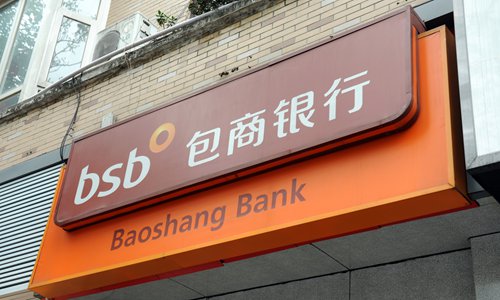HOME >> BUSINESS
Markets stable after takeover of China's Baoshang Bank
Source:Global Times Published: 2019/5/26 21:33:39
Regulators working to minimize impact; experts urge better law enforcement

A branch of Baoshang Bank in Huaibei, East China's Anhui province File photo: IC
Financial regulators said on Sunday that the deposits and interest due in Baoshang Bank (BSB) will be protected in the wake of its takeover, and market liquidity will also be maintained to ensure normal operation. Regulators took over the bank Friday, citing "serious credit risks."
Experts called for stronger law enforcement in cases of financial misconduct by smaller commercial banks to ensure the safety of the financial system amid an increase in the non-performing loan (NPL) ratio.
It was the first city commercial bank to be taken over by regulators in almost 20 years.
The China Banking and Insurance Regulatory Commission (CBIRC) and the People's Bank of China (PBC), the central bank, told a press conference on Sunday that they are working to minimize the cost of the takeover of Baoshang Bank, based in North China's Inner Mongolia Autonomous Region.
They also vowed to "resolutely prevent systemic risks" and to ensure the operations of Baoshang Bank and the financial safety of its clients.
"A government takeover is a method of financial stabilization, which I think is very effective in curbing potential risks. With such government backing, there will be no payment risks for BSB clients, especially depositors," Cong Yi, professor at the Tianjin University of Finance and Economics, told the Global Times.
"As far as I know, the government has intervened, maybe not by a direct takeover but certainly through other means, to help some small banks sort out their assets and reorganize their businesses," Cong said.
Xi Junyang, a professor at the Shanghai University of Finance and Economics, told the Global Times that the takeover, because of its "serious credit risks", is a timely decision given the rising NPL ratio.
China's NPL ratio has been climbing since 2011. At the end of 2018, the ratio reached 1.89 percent, according to statistics cited in a report by Reuters in February.
"When the economy faces downward pressure, the NPL ratio usually goes up," Xi said.
Baoshang Bank's credit crisis is not the first of its kind. Haifa Bank of China in South China's Hainan Province was the first commercial bank to be shut down because of its credit crunch. The bank became insolvent in 1998.
More recently, Bank of Tianjin - based in North China's Tianjin Municipality - has been under close watch and was ordered to pay severe fines for a large NPL ratio.
Newspaper headline: Markets stable after takeover of BSB